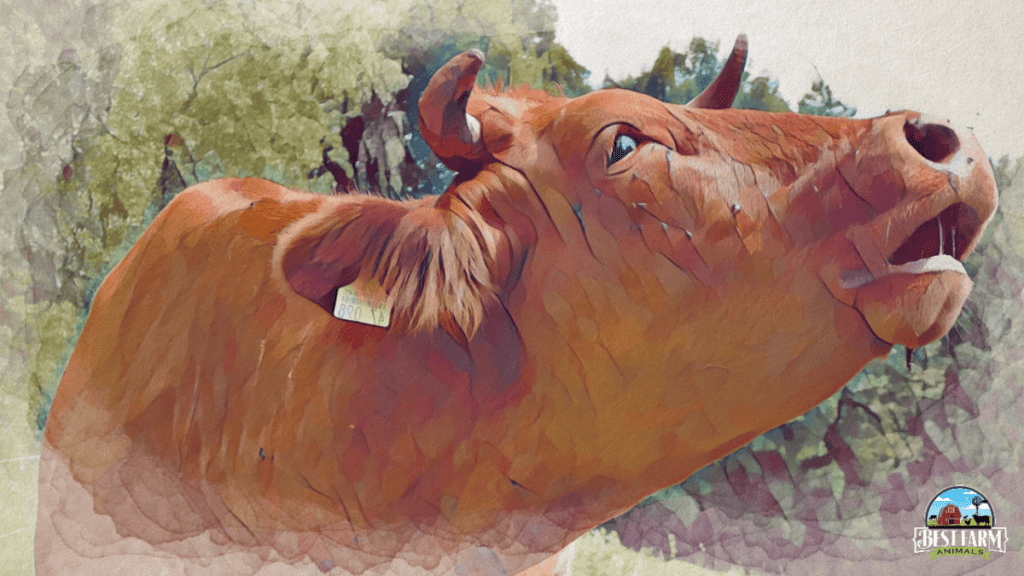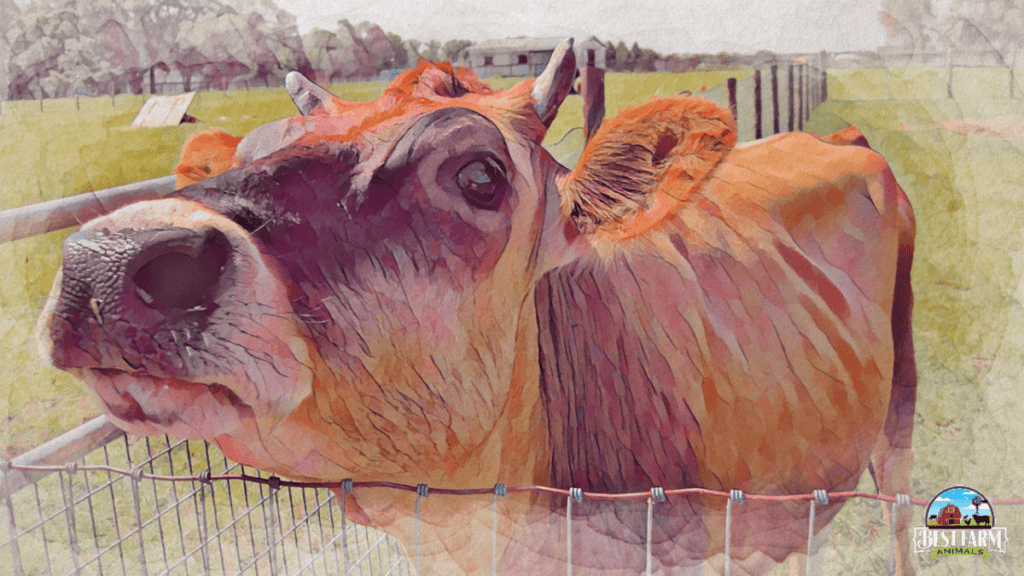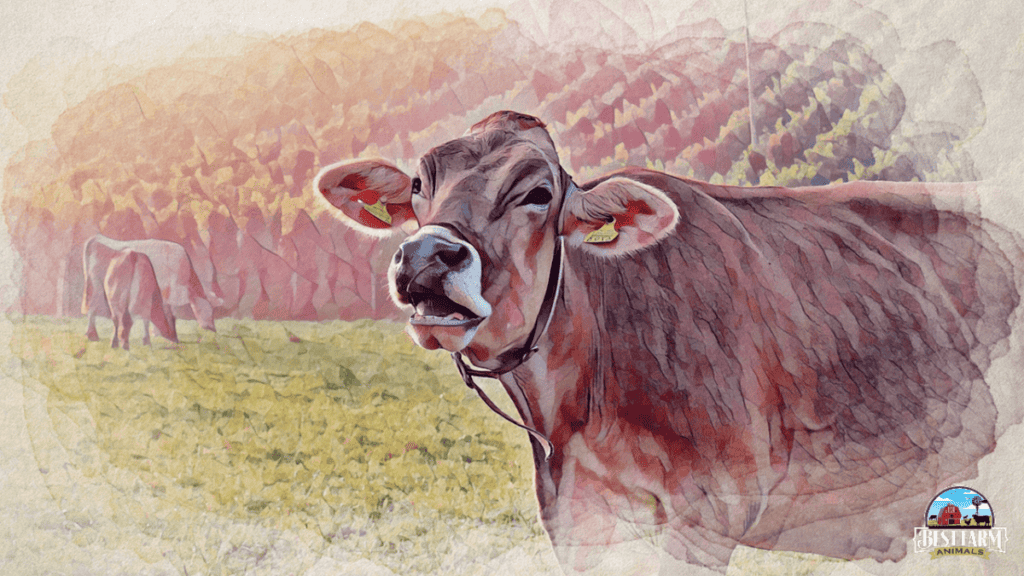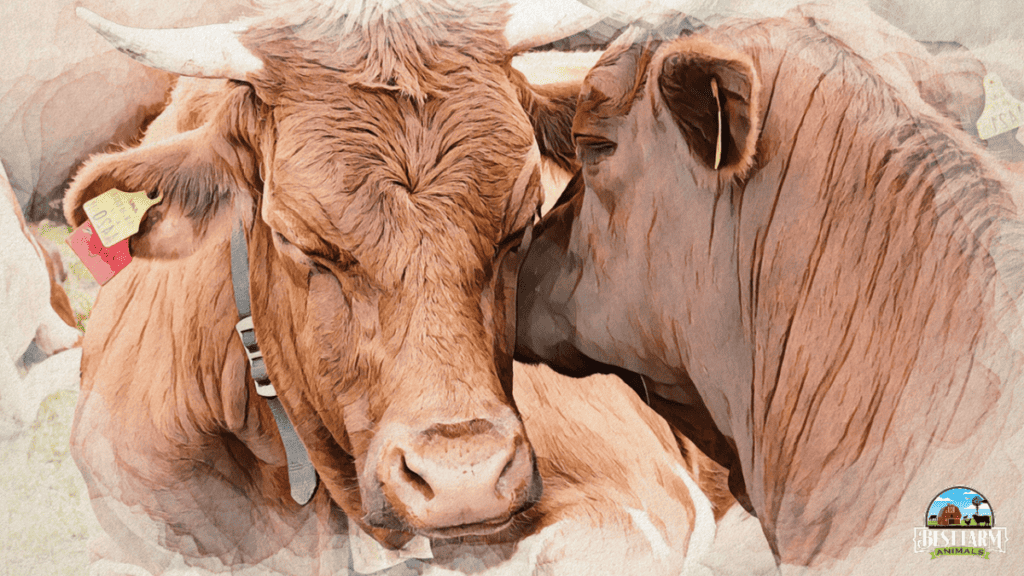My straight-from-the-city cousin came to stay for an extended visit this summer, so imagine my surprise when she banged on my door at 4.30 am. She was terrified and upset.
“Why are the cows crying?” she demanded.
I’m the country cousin, so I am used to the sounds of a farm. I don’t really register the usual morning sounds as much, but the sound of the cows calling to be milked had woken my cousin, and she was in some distress. In hindsight, I can imagine that a cow calling out is a rather mournful sound, and it must have sounded like the cows were crying.
So why do cows cry?
Cows cry for many reasons, and some are emotional, such as when they feel fear. However, cows also cry out to their herd. They call for their lost calves and to socialize with their friends. Like any social animal, a cow in distress may also cry out loudly. Sometimes, their distress triggers a physiological response, and the cows may cry real tears.
My cousin was surprised to see the cows calm down as soon as I began to milk the large udders for the morning milking. Suddenly full of questions, she asked me to explain more about why cows cry and what to do when they cry.
Table of Contents
What Does a Crying Cow Sound Like?
Cows make various sounds, from low grunting to loud mooing sounds. A keen repetitive mooing that becomes high-pitched is the sound of a cow in distress, and this is the sound of a cow crying.
When the cow becomes agitated and distressed, they can even begin to salivate in a panic response that moistens their nose and mucus membranes in the eyes. As a result, the cow may produce real tears and foam in the mouth.
If a cow is physically unwell and cries due to feeling ill, it may produce a lot of mucus, which can be distressing to witness. Crying out heightens the cow’s average body temperature, further stimulating tear production. The cow’s inner eyelids may redden with their increased blood pressure. Red eyes are a typical crying response we humans also have.

5 Reasons Why Cows Cry
So why do cows cry?
Obviously, my cousin (being vegetarian) insisted that cows only cry when they’re about to die. And yes, it’s undeniable that some cows can become fearful when taken to the slaughterhouse, but not all cows cry because of fear. There are several reasons why a cow may cry.
1. Fear
Okay, let me explain the reason that cows cry out in fear. Most animals cry or call their herd members when they feel afraid. Any prey animal, such as cows, pigs, horses, and even chickens, has an instinctual response to call for help when they are afraid. Humans also cry when afraid (we scream if we think someone is chasing us).
A cow will call out when they are scared. This fear instinct is triggered by anything from being alone to feeling hungry or seeing something strange. Chickens will also cry loudly when they feel alone (a two-day-old chick will scream bloody murder to find their mom if they are alone).
So a cow may call out loudly when they feel afraid, but they may also call out because they are in a new place.
While we can speculate whether a cow knows what a slaughterhouse is and if they are afraid because they know they will die there, the extent of their understanding is still unclear. Slaughterhouses are operated as humanely as possible in the U.S. with strict regulations regarding the treatment and slaughter of cows.

2. Basic Needs
Cows cry when their basic needs aren’t met at that moment. My cows sounded quite upset when my cousin heard them while waiting for their morning milking session. The cows rely on the process to relieve the pressure in their full udders, so they felt quite uncomfortable as they had a full milk load. The cows were calling to remind the workers and me that it was time to milk them. Cows don’t like having a full udder as it can lead to mastitis.
Other basic needs that may make a cow cry aloud include thirst, hunger, loneliness, or boredom. I recall the first time I took two horses to an event at a show with the horsebox. As soon as we drove onto the ranch, the other horses came running up, calling loudly, while the two in the trailer also neighed continuously. Animals chat, and to expect them to be mute is illogical.
If you’ve raised a pet cow, you would know how demanding they can be. A pet cow will call out for you any time of the day simply because they miss you and want a treat.
In the herd, a cow may call out and cry if they are being starved or struggling to find food. Cattle cry out to the rest of the herd, asking whether the other cows have found a food source, while the herd may call back to let them know where food is.

3. A Sick Cow
Sick cows may also call out. They may call out if a cow is unwell or is close to dying (of natural causes). In this case, the cow is crying for help, wanting relief from a fever, pain, or discomfort.
A domesticated cow may be quite used to their owner helping them through complicated processes such as calving, so they may call out when they feel otherwise unwell.
4. A Trapped or Injured Cow
Cattle call out when they are injured. Any rancher can tell you how gut-wrenching the sound of a cow trapped in barbed wire can be. In pain, scared, and confused, a cow will cry loudly, wanting freedom but unable to help itself.
There have been many instances where trapped cattle’s calling alerted ranchers to their fate so that the ranchers could rescue them. Crying, in this instance, serves the purpose of finding help for the cows.
5. Experiencing Loss
Cows aren’t mindless. Some cows are incredibly intelligent. They love to play games and become attached to other living beings. When a cow loses her calf, she reacts like all mothers do: by showing distress and sorrow. A cow that has lost a calf or suffered the loss of a companion will be heartbroken, and their cries can be terribly sad.

What to Do If a Cow Is Crying
My cousin demanded that we do something to relieve the cows immediately as they sounded so sad. So, in our PJs and barn boots, we headed to the milking shed where my cousin had her first lesson in milking a cow. As soon as the warm milk began flowing from the swollen udder, the cow became peaceful and stopped crying.
With one happy cow heading back to her pasture, I explained how you could help a cow if they are crying (and this, of course, depends on the reason for its crying).
- Fearful Cows
When cows are afraid, the best thing you can do is to calm them. Speak to them in soothing tones, identify what has them spooked or fearful, and remove the cause of their distress. Cows can be scared of anything, from the call of nearby jackals to a sudden windstorm shaking the barn’s roof panels or a raging wild fire that threatens them.
Keep your cows calm by regulating their environment and ensuring they aren’t being scared by children, animals, or their environment. Some cow breeds are more fearful than others. Herefords tend to be docile and easily spooked, but they also calm down quickly. Other more tense cattle, like jersey cows, tend to be easily agitated and may take a while to calm again.

- Meet Their Basic Needs
If your cattle are crying because their basic needs aren’t met, you should take steps to ensure you can meet their needs for food, water, family, and safety. Ensure you feed appropriately to satisfy your herd’s hunger.
Keep an eye on their family dynamic, and if you notice one cow is being bullied, you may need to intercede as that cow can begin to feel threatened and may cry for help.
- Sick Cattle
Ill cattle should be treated appropriately and with urgency. No animal should suffer, whether they are bred for slaughter or not. Tend to your sick cattle by identifying what is physically wrong with them and calling in the help of a vet when you’re not sure what ails them.

- Trapped or Injured Cattle
Help the cow relax if it is stuck in a hole or has managed to hook your three-year-old’s toy car across its horns. Work quietly, so you don’t spook them further as you patiently help them out of the situation.
An injured cow can become unsettled, leading to further injuries and long stretched-out complaining moos.
- Stop Sad Emotions
When you know what makes a cow sad, you can help cheer her up or comfort her so she won’t be as sorrowful. Mediate between the cow and the calf, which may require unusual tact.
Placing an orphaned calf with a mother that just lost her calf can help bring comfort and safety to the human and the calf. The result is that the cow will become calm and feel less sad. She will become more interested in grazing, and soon, she will have accepted her loss.
Top Tip: If your cow has lost her calf in the pasture or barn, it is essential to allow the cow time to grieve. Don’t separate the dead calf from the cow yet. Instead, allow the cow and her offspring time to accept the inevitable.

Crying Cow FAQs
Question: Why would a cow cry?
Answer: Cows cry when they are neglected or if they feel upset about the extra noise or drama that surrounds them. Tears are a natural reaction and can be misread as being senseless.
Question: What is the purpose of a cow crying?
Answer: Cows can cry out in fear and as a warning to the rest of the herd when danger is near. However, cows also cry when they are upset about the loss of a companion, or a cow may cry over her calf if the calf is taken away. When weaning young cows, they may cry out, wanting their mothers.
Question: Why do cows often cry at night?
Answer: At night, a cow may have limited vision, and it is the time when nocturnal predators such as mountain lions may hunt. Cows may cry out when they smell the predator’s scent or become scared by night sounds.
Recommended Cattle Supplies (And Dairy Supplies)
This list contains affiliate products. Affiliate products do not cost more but helps to support BestFarmAnimals and our goal to provide farm animal owners with accurate and helpful information.
This shelter is pretty easy to put together and it shelters a good number of cows. It’s sturdy and can withstand our high winds and heavy snows. And it’s cheaper than a barn and easier to build.
Colostrum is critical for calves. If you aren’t able to get some from your cows, this is a quality supplemental colostrum.
Probiotic for cattle with digestion issues in a oral tube. It works for other ruminants and is safe for goats, but is formulated especially for cattle.
A halter to lead Bessie around. This show halter also works for kids showing for 4H.
All Stock Feed is on Amazon, but you’ll pay less if you find it at your local feed store. It’s a great feed for cattle.
Electrical rope for your fencing. This keeps cattle in, but goats, alas- not so well.
Dairy Cow Recommended Supplies
Disposable towels or wet wipes are the first step in cleaning the udders.
Teat Dip and a dip cup are essential for keeping your milk clean. It lasts a while. Mine usually lasts a year to a year and a half.
I use a stainless steel bucket when I milk because it’s easy to clean and carry. These are my preferred milk filters and I use them for cow and goat milk.
This large jar funnel stays much more stable than regular funnels and can handle larger milk volumes.
I like this grain feeder while milking and use this size for the cows and goats being milked.
Balm ointment for sore udders. This cream is popular for people but formulated and created for cows’ udders.
Mastitis Test detects mastitis.
Conclusion
Cows can cry. My cousin heard the cows calling to be milked, which is one of the more peaceful reasons cattle cry. The other reasons for a cow crying may be less peaceful, and it’s up to a responsible homesteader to ensure their cattle have their needs met and are safe and injury free. You should keep the herd’s fear levels as low as possible.
No animal should live in distress, so always try to keep all your cows as calm as possible. Help your cows feel safe and relaxed; you should only hear them cry when they are chatting and ready for milking.

